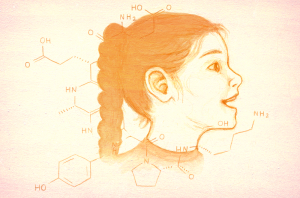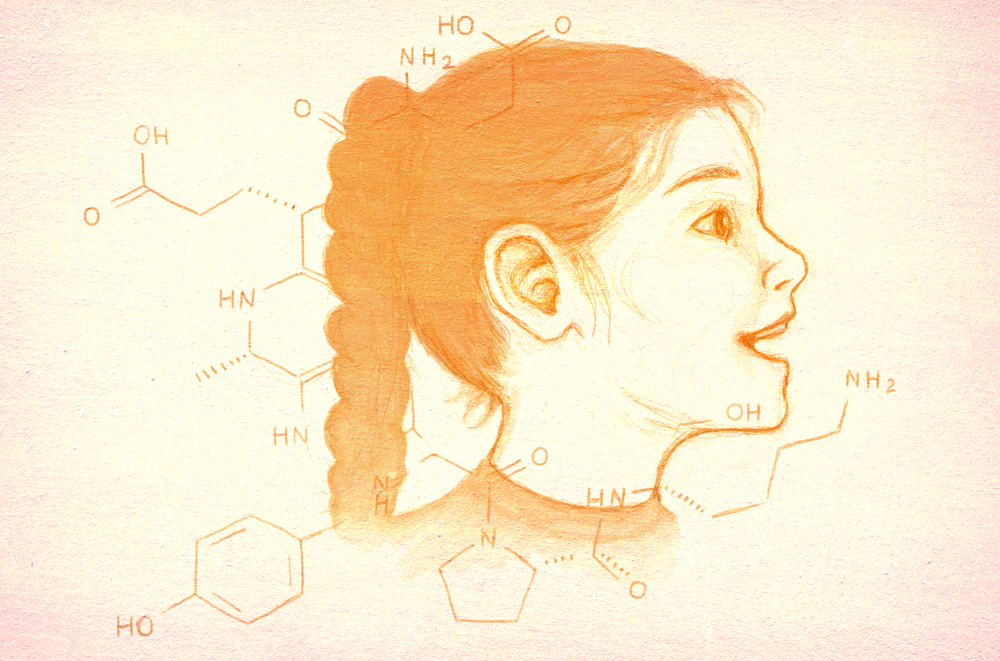Transcription of an accidental recording made by a home assistant device and sent to the email address of Dr. Marguerite Van Neelsing, a leading ethicist in the field of psychology.[1] Dr. Van Neelsing and Dr. Cecilia Kennedy, a language expert, further transcribed the manuscript and first published it in Exiled Resources (January 2019). Key words: human growth hormone, cadaver brain, experiments on school children, psychology.
Art by Leigh Legler
Now this one has legs–I can see the distinct viscous, ruby red lines clinging to the glass. More wine for me, then! I’ll pour just a smidge more for a lonely lady late on New Year’s Eve … Ah, now that soothes the soul. I only have one glass a day–one glass I need to refill from time to time, but a glass a day keeps the crazies away. That’s what I believe. I didn’t always drink. It wasn’t until I started teaching, back in the 60s and early 70s. Oh! The pressures we elementary teachers faced! We didn’t necessarily face them from parents or anything like that. Back then, parents still believed that teachers were always right and that children needed to behave. The administrators, on the other hand, were relentless in their efforts to push us to be innovative–to remain on the leading edge of new teaching methods. In our tiny district, the superintendent fancied himself a kind of mover and shaker who would advance to a more desirable school district and really make a name for himself there. So, he depended on us schoolteachers to make him look good. Lord knows he was too stupid to do it on his own. Oh, there were incentives too, mostly in the form of bonuses. We never got permanent raises or anything like that. Instead, he just threw $50 here and $100 there, which we’d all greedily grab.[2]
Well, I was certainly desperate and greedy. I mean, you can’t really be anything else in an environment like that. The desire to compete and be the best just covers you like a translucent coating that clings and suffocates, but you don’t notice it because you can’t see it until years later, once the kids have grown, the husband has died, and you’ve already polished off a bottle of Merlot and you’re starting on a another one …
Ah, the things we did. The things I did for a few hundred dollars over five years. I carefully documented everything, thinking the superintendent would be impressed by my meticulous nature and my ability to use logic and numbers–my ability to subtly observe and record my experiments, which were somewhat psychological and medical in nature. In those days, I was in charge of a second-grade classroom, and I had delightful ideas for rewarding students with air-popped popcorn and stickers. I had all kinds of stickers for the children. Of course, some got more than others, and why shouldn’t they? Why shouldn’t I reward the brightest ones? In fact, I noticed that the smartest and most popular students happened to be the tallest and, quite frankly, I simply liked them better as well. There were a few girls in particular that were shorter and a few of the boys too, and I’d just hate it when they would luck out and earn a sticker. I just didn’t think it was right or natural. However, I tried to put my judgments aside, and I decided that maybe I could help these students–help them grow a bit. I soon discovered that I was developing a hypothesis based on a few observations and teaching experiences: taller students seem to be more intelligent and popular than shorter students, so if shorter students were given a human growth hormone, their brains might expand as well and make them more capable of retaining and processing information. Also, if intelligence is a social determiner for success and wellbeing among groups, then shorter students who grow taller might have a chance at being included in society …

In any case, I tried really hard not to hate this child so much. Instead, I decided I should help her.
~
Notes:
[1] Transcriber’s Notes: The original transcription, dated December 31, 2018, recorded the spoken memories of retired elementary school teacher Dara Huntington, who must have had no idea that her home assistant device was capturing her recount. In her recount, she describes her classroom experiments of the 1960s and 1970s. It is presumed that she was reminiscing and talking to her cat, since the home assistant device transcription seems to capture a “meow” every once in a while. It is hypothesized that Dr. Van Neelsing ended up with the transcription through the following key words that the home assistant device selected: human growth hormone, cadaver brain, experiments on school children, and psychology. Before her sudden death, Dr. Van Neelsing consulted with Dr. Cecilia Kennedy, a language expert, and together they published an edited version of the transcript in Exiled Resources.
To read the rest of this story, check out the Mad Scientist Journal: Summer 2019 collection.
Dara Huntington: Is survived by her cat and two grown children. An autopsy revealed that she died of poisoning December 31, 2018. Her lab notes have never been recovered.
Dr. Marguerite Van Neelsing: Was a respected and beloved ethicist and professor. She and Dr. Kennedy were once neighbors and, according to Kennedy’s remarks at a professional conference, Van Neelsing kept “one heck of a garden.” She is already greatly missed by her students. Her biggest mistake was willing the care of her garden to Dr. Kennedy, whose own container garden of cacti is on the verge of annihilation.
Cecilia Kennedy: Earned a doctorate in Spanish and taught in Ohio before moving with her husband, teenage son, and cat to the greater Seattle area. Together, they own a Google Home Mini, which is a delightful innovation, as long as it’s locked away whenever anyone wants to tell a story about their day. She writes horror stories that have appeared in Headway Quarterly, Gathering Storm Literary Magazine, Coffin Bell, Sirens Call, Maudlin House, and Open Minds Quarterly. However, she reserves her “scariest” writing for her DIY blog, Fixin’ Leaks and Leeks (http://fixinleaksnleeksdiy.blog/), where she describes her attempts at cooking and home repair.
Leigh’s professional title is “illustrator,” but that’s just a nice word for “monster-maker,” in this case. More information about them can be found at http://leighlegler.carbonmade.com/.
“Classroom Experiment” is © 2019 Cecilia Kennedy
Art accompanying story is © 2019 Leigh Legler
